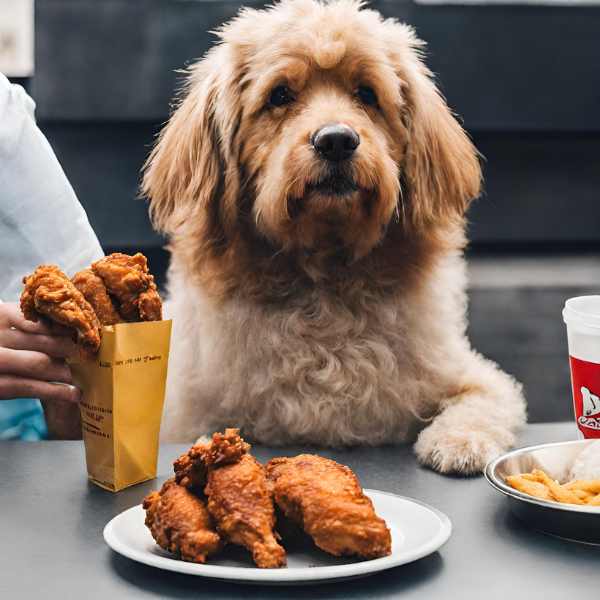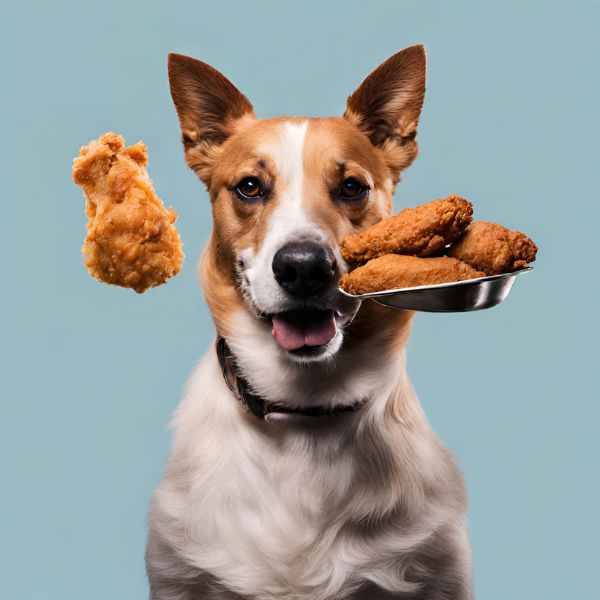Can Dogs Eat Lemon Chicken? The short answer is no, dogs should not eat lemon chicken. Lemon can be harmful to dogs due to its acidic nature, which may cause stomach upset, vomiting, or diarrhea.
Moreover, the seasoning and spices often used in lemon chicken recipes, such as garlic and onion, are toxic to dogs and should be avoided.
In this article, we will explore the potential health risks of feeding lemon chicken to dogs, some prevention guides, and some best alternatives for the well-being of your pup.
What is Lemon Chicken?
Lemon Chicken is a delicious treat that is prepared by mixing savory and citrus flavors. It is mostly used in Asian regions.

The juicy meat and zesty citrus flavor make it special and super tasty. The magic of lemon chicken is that it gives you a unique taste and a variety of different spices stay in your mouth.
Can Dogs Eat Lemon Chicken?
No, While chicken itself is a great protein source for dogs, it’s essential to be careful with lemon-flavored dishes.

Citrus fruits, including lemons, can be irritating to a dog’s digestive system, and potentially lead to stomach upset or even toxicity in large amounts.
It’s best to avoid such types of seasoned chicken without any citrus seasoning to ensure your dog’s well-being. If you’re unsure, consulting with your vet is always a good practice.
Reasons to Avoid Feeding Lemon Chicken to Your Dogs
Here are key points highlighting the potential concerns associated with dogs consuming lemon chicken:
Digestive Upset: Lemon and its acidity may upset a dog’s stomach, leading to digestive discomfort.
High-Fat Content: Lemon chicken often contains fatty elements, contributing to excessive calorie intake for dogs. Excessive fat can lead to obesity and related health issues in our canine companions.

Spices and Seasonings: Seasonings used in lemon chicken, such as garlic or onion, can be toxic to dogs. Dogs have different tolerance levels for spices, and some may cause adverse reactions.
Potential Allergies: If your dog eats it in large quantities, its allergies can be triggered and they can get some health problems. Allergic reactions can manifest as itching, skin issues, or digestive disturbances.
Sodium Concerns: Processed chicken can have a high content of sodium which can greatly impact the cardiovascular system of your dog. So avoid feeding your dog too much sodium content as it can lead to increased thirst, urination, and potential kidney issues.
Digestive Blockage: Bones in chicken have many side effects and can pose a choking hazard or lead to digestive blockages. If bones get stuck in the digestive tract of dogs, it can cause many internal injuries.
Signs of Allergies or Discomfort
If your dog consumes anything unusual and shows a lot of signs of discomfort and digestive issues, it means they are allergic or cannot handle the food.

Dogs can have some stomach problems such as diarrhea and vomiting. Also, pay attention if your dog seems tired or suddenly has less energy.
If you notice any of these signs, you must talk to the vet immediately. They can help you figure out if your dog has any type of allergy and give you good advice to keep your dog healthy.
How to Prevent your Dogs From Eating Lemon Chicken?
Here are the following key measures to consider:

Secure Storage: Keep lemon chicken out of your dog’s reach by storing them in sealed containers or high-up places.
Training Commands: Train your dog with commands like “leave it” and “stay” to deter them from approaching or consuming inappropriate foods.
Supervision: Always supervise your dog during meal times and gatherings to ensure they don’t sneakily grab forbidden treats.
Educate Family Members: Inform everyone in your household about the hazards of feeding human food to dogs, especially foods like lemon chicken.
Consult a Vet: If your dog manages to ingest lemon chicken, consult your veterinarian immediately to assess potential health risks.
Best Alternatives of Lemon Chicken for Dogs
Grilled Chicken: Choose plain grilled chicken as a lean protein source without added spices or oils.
Turkey Breast: Cooked turkey breast offers a tasty and protein-rich alternative for your dog’s diet.
Haddock: Rich in omega-3 fatty acids, haddock can be a nutritious and flavorful choice.
Lean Beef: Cooked lean beef is another protein option, but ensure it’s free of seasonings.
Sweet Potatoes: These provide a healthy carbohydrate source and can be cooked and diced for dogs.
Carrots: Crunchy and low in calories, carrots make a great, teeth-friendly snack.
Pumpkin: High in fiber, plain pumpkin (not pie filling) can be a digestive aid.
Blueberries: Packed with antioxidants, blueberries can be a delicious, bite-sized treat.
FAQS
How often can I feed lemon chicken to my dog?
Moderation is key. Introduce it gradually and observe your dog’s response. Occasional treats are fine, but they shouldn’t replace their regular diet.
What signs indicate that my dog may be allergic to lemon chicken?
Look out for signs like itching, vomiting, or lethargy. If you notice any unusual behavior, consult your veterinarian.
Are there other citrus fruits that dogs can safely consume?
In moderation, some dogs may tolerate small amounts of fruits like oranges or tangerines. However, always consult your vet before introducing new foods.
Can I share my lemon chicken leftovers with my dog?
It’s not recommended. Seasonings and preparation methods in human meals might not be suitable for dogs. Stick to dog-friendly recipes for your pet’s safety.
Conclusion
In conclusion, lemon chicken is not recommended for dogs to eat, because it contains ingredients which are toxic to dogs . So it is best to avoid feeding lemon chicken to your dog.
Make sure you provide plain cooked chicken to your dog and avoid feeding your dog any lemon products in large amounts. As we all know chicken is an excellent source of protein that is very good for health.
So hopefully you liked the article and got a lot of help from it. Happy Snacking!
